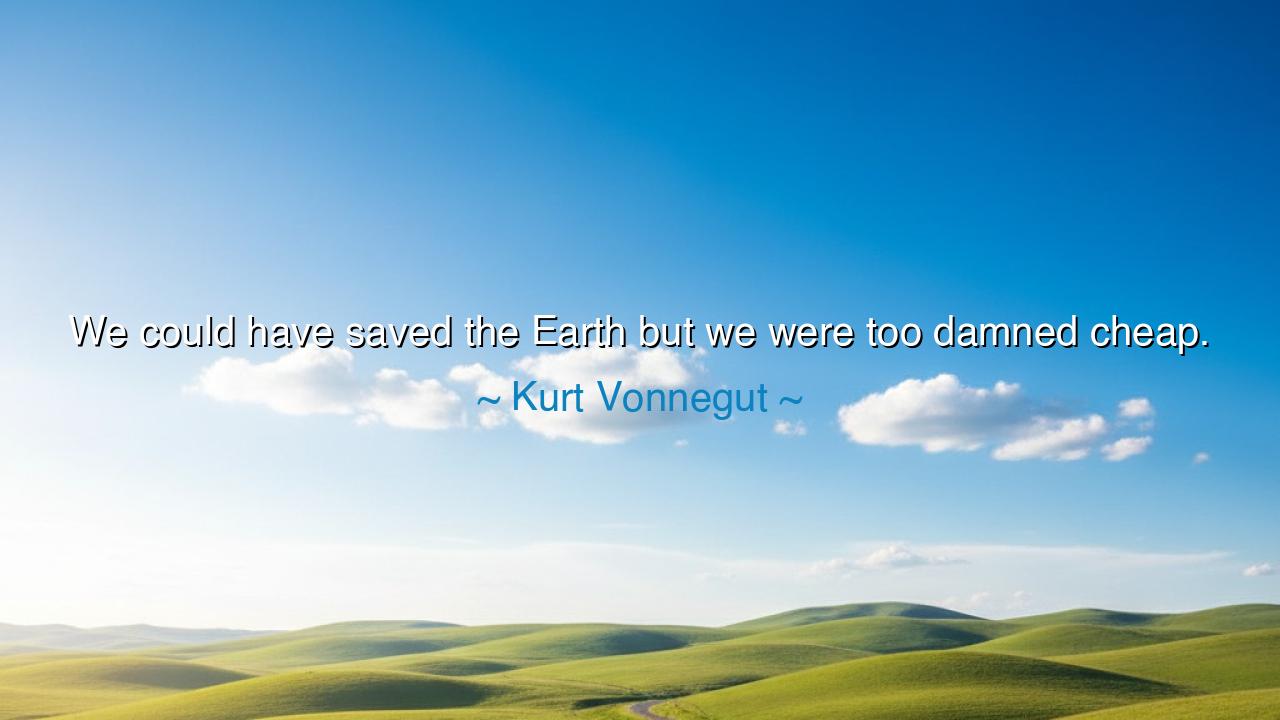
We could have saved the Earth but we were too damned cheap.






When Kurt Vonnegut said, “We could have saved the Earth but we were too damned cheap,” he spoke with the voice of a prophet lamenting the blindness of his own generation. It is a sentence laced with irony and sorrow — a truth sharpened by his wit and despair. Beneath the humor lies a profound accusation: that the destruction of our world was not born of ignorance, but of greed and apathy. We knew what must be done. We possessed the tools, the knowledge, and the time. But we lacked the will to pay the price — not in money alone, but in comfort, sacrifice, and conscience. Vonnegut, ever the moral satirist, laid bare a tragedy as old as humanity: that people often prefer convenience to survival, and the present moment to eternity.
In the ancient way of speaking, this quote is a lament for hubris, the pride that blinds mankind to the consequences of its own actions. The ancients warned that those who defy nature for gain will meet ruin, yet each age repeats the folly anew. In Vonnegut’s lifetime, the smoke of industry rose like a dark altar to progress. Forests fell, rivers were poisoned, and skies grew heavy with the exhaust of ambition. Yet even as scientists raised the alarm, the merchants of wealth replied, “It costs too much to change.” Thus, the Earth — our only home — became collateral in a bargain struck between greed and comfort. Vonnegut saw this and wept in irony, for he understood that the price of inaction is always greater than the cost of prevention.
Consider the story of the Dust Bowl in 1930s America. Farmers, driven by short-term gain, plowed deep into the heart of the plains, stripping away the grasses that had anchored the soil for centuries. When the winds came, the land itself rose into the sky and fled. Black clouds of dust buried towns, choked children, and drove families from their homes. The Earth, exploited beyond its patience, took back what was hers. The tragedy was not that people lacked wisdom, but that they ignored it. They knew the danger, but chose profit over prudence — just as Vonnegut’s warning suggests. The Earth could have been saved; instead, it was spent like currency.
Vonnegut’s words are also a mirror held before our own century. In his time, pollution was the sin of the factory; in ours, it is the sin of indifference. We live in an age of abundance, yet we consume as though there were no tomorrow — and perhaps there will not be. Glaciers melt, forests burn, seas rise, and still humanity clings to comfort like a drowning man clutching gold. We say the solutions are too costly, the changes too inconvenient, the sacrifices too great. But as Vonnegut foresaw, this is the language of decay. Civilizations die not because they cannot save themselves, but because they choose not to.
And yet, within his bitterness lies a spark of hope. Vonnegut’s irony was never without purpose; his despair was a call to awaken the moral imagination. He wanted his readers to feel shame — not the paralyzing kind, but the kind that drives transformation. To be “cheap,” in his sense, is to be small of spirit, to value possessions more than posterity. The remedy is not wealth but generosity, not guilt but responsibility. He challenges each of us to live with foresight — to pay today what the Earth demands, that our children may live tomorrow. For every act of preservation, no matter how small, is a defiance of the laziness that has doomed empires before us.
The ancients would have called this wisdom stewardship — the sacred duty of tending what has been entrusted to us. In their temples, they prayed to the gods for good harvests, but they also honored the soil with rest, the rivers with respect, the air with purity. They understood that man is not master of the Earth but her caretaker. Vonnegut’s modern lament is the echo of that forgotten reverence. To “save the Earth” is not merely to protect it from harm, but to protect our own souls from the corruption of greed. The Earth does not need our pity; it demands our partnership.
So let the lesson ring clear as thunder: the price of preservation is less than the cost of destruction. If we wish to honor the Earth, we must cast off the illusion of cheapness — for nothing of value comes without sacrifice. Plant trees whose shade you will never rest beneath. Consume less so that others may have more. Measure wealth not in possessions, but in the purity of your air and the clarity of your conscience.
And when future generations ask why we did not act, let them not say we were “too damned cheap,” but that we finally learned to spend — our time, our effort, our care — in defense of the only world we will ever have. For that, as Vonnegut knew, is not a loss, but the most sacred investment of all: the salvation of Earth, our home and our heritage.






AAdministratorAdministrator
Welcome, honored guests. Please leave a comment, we will respond soon